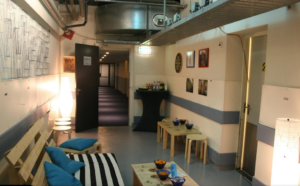
There’s a great attraction in a small basement near the centre of The Hague, called Amaze Escape – http://www.amaze-escape.com. Essentially they have three rooms – you choose one of these rooms for your “Escape adventure” and are then locked inside. You have one hour to find clues, figure out riddles and puzzles, and work out how to escape the room. It’s absolutely great – we chose the “KGB” room which is really atmospheric (I’m not sure the kids got all of the references to the former Soviet Union, but they loved it anyway!) and they’ve done an amazing job of making in not too difficult, not too hard and really exciting.
So if you’re ever in The Hague, go – you’ll have a great time. But you don’t have to believe me – just head over to their Trip Advisor page to read what everyone else thinks – http://www.tripadvisor.co.uk/Attraction_Review-g188633-d5539567-Reviews-Amaze_Escape_Events-The_Hague_South_Holland_Province.html. And this is what made me realise what a great, simple and singular marketing job they were doing getting their small business up and running.
Firstly, let me describe the long and complex process we used to decide to go to Amaze Escape:
- Open the Trip Advisor app on the iPhone, select The Hague and “Attractions”
- Skim through the top few items (it defaults to being ordered by rating) to see what sounds like fun
- See that Amaze Escape is the #2 rated attraction in The Hague, and click through to its Trip Advisor page
- Read lots of great reviews and the descriptions on that page of what it basically is
- Book it
Erm, and that’s it. No “brand awareness”. No Google searches, no “Content marketing”, reading articles about the benefits of “Escape room themed attractions”. Just a search on Trip Advisor, reading some good reviews, and booking made.
When we got there we realised it really was a startup – there were lots of clues, such as: it wasn’t enormously well sign-posted at the building, there were just a couple of people working the exhibit (who were obviously the owners of the business), everything was running off iPods and laptops, and lots of other little clues. But that’s one of the things I really loved about it! It was very “pre-corporate”. One of the guys there was really proud that he’d devised all of the clues for the rooms. And what was particularly great was the amount of effort they put in. They were great hosts, really friendly, and they’d obviously spent a lot of time on the details – the sorts of things that get lost later on, when someone decides to “rationalise” a service, and work out on a spreadsheet what the “Minimal Viable Product” is – i.e. what corners can we cut. So, free drinks when you get there, photos taken of you in the room that get sent through later, flexibility with the booking, lots of time spent with us afterwards talking about his business and how it all works (he wants to open one in London, which sounds great!), an unasked for discount for the kids and so on. All the sorts of nice things that disappear when business like this grow – he was doing things that “don’t scale” while he could.
But what about the marketing? The clue came when I mentioned off-hand “Yeah, I think you were #2 on Trip Advisor” to which he immediately replied “Yes, we were #3 the week before that and #7 before that”. I chatted to him a bit more and as far as I can see his marketing strategy is “Get good reviews on Trip Advisor and one or two other sites, that’s it”. I doubt he’d phrase it like this, but taking the Good Strategy/Bad Strategy model:
- Main obstacle – no-one has heard of us in a crowded market
- Unfair advantage – we can “do things that don’t scale” providing an exceptional experience – something the big companies can’t
- Strategy – use our unfair advantage to get amazing reviews on the sites that people use to leapfrog other attractions
And consciously or unconsciously this has led to the actions/objectives of focussing almost solely on getting good reviews on Trip Advisor.
I.e. they’ve figured out “What’s the one single thing we can do which will make a massive impact on our business this year (they’ve been going a year) – let’s just do that”. May be they have a graph somewhere showing “Rating on Trip Advisor for The Hague” (though I suspect not, as they both seem to have the graph in their heads).
What to learn from this? – only the value of a mono-focus on an intelligently set objective, chosen for maximum impact. They knew what their unfair advantage was (that they could provide an amazing experience), what their problem was (when they started, no-one knew about them – they had no web presence or brand), and figured out a clever way of fixing that.